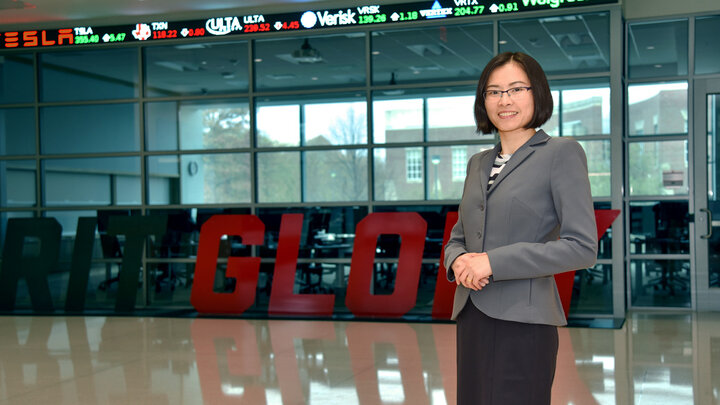For many firms in the U.S., corporate bonds are an important source of capital, yet how these bonds are priced remained a black box to investors and firms alike. The latest research from Liying Wang, associate professor of finance at the University of Nebraska–Lincoln College of Business, serves as the first analysis on the corporate bonds offering process and sheds light on how they are priced.
“Liying’s research helps us understand how corporate bonds are priced in the market,” said Janet Near, associate dean of faculty and research, Howard L. Hawks Chair in Business Ethics and Leadership and professor of management. “Corporate bonds provide about $1.1 trillion in funds per year to support U.S. firms, a critical source of capital to support economic growth. Yet data suggest that corporate bonds are often underpriced. This underpricing leaves investors that are allocated these underpriced bonds to gain immediate profits. This ‘money left on the table’ triggers regulatory concerns and discussions.”
Dr. Wang’s research helps to explain why this happens, which is useful information for investors, issuers and regulators.”
Wang’s study, “Lifting the Veil: The Price Formation of Corporate Bond Offerings,” recently published in the Journal of Financial Economics, examines how the corporate bond offering price evolves in the primary market, where underwriters evaluate, market, re-assess and price the bonds, before they allocate them to investors. While a popular view is that corporate bonds are easy to price so that underwriters know all information they need, her research suggests this is not the case.
“Corporate bond offerings exhibit considerable uncertainty related to investor demand and value, so corporate bond underwriters, like equity underwriters, also employ a schedule of underpricing and allocation to facilitate the price discovery. This schedule reduces underpricing and increases bond issuers’ proceeds on average,” Wang explained.
The research also revealed new patterns in the price formation of corporate bond offerings different from normal equity price formations, which Wang said warrants further investigation. With such a complex topic, Wang hopes her research paints a clearer picture for all involved.
“Despite its importance, corporate bond offerings are understudied. I am intrigued by studying the interplay between underwriters, investors and firms in the financial markets. This research provides useful references to firms, investors and regulators in understanding the important yet not well-understood corporate bond offering process,” Wang said.
As the sole author of the paper, Wang faced challenges like the lack of feedback from other authors on the study, which she stated could impede people from completing the project. However, Wang acknowledged the immense support of her peers from the Department of Finance at Nebraska, which helped her address such challenges.
“The Department of Finance is a very collegial place where senior professors go the extra mile to support junior faculty research. My colleagues provided me invaluable feedback at different stages of my sole-authored project, which contributed significantly to its success and encouraged me to continue pursuing the project. I am grateful to be a member of the department and the college,” Wang said.
Alongside faculty members within her department, Wang graciously credited the support she receives from the college. Near noted that the College of Business funds many faculty research projects, including Wang’s, through private support generously contributed for this purpose.
“We are very pleased we can fund innovative faculty research in this way. Dr. Wang’s studies have been published in prestigious journals and help to enhance the research reputation of the college,” Near said.
Wang’s interest in corporate bonds carries through in her other studies. She plans to continue researching and exploring this area further.
“My new projects examine investors’ flipping activities in the corporate bond market and how corporate bond investor demand shapes firm policies. Echoing the mounting concerns regarding sustainability, I also have a project examining the green bond offerings,” she said.
To read the study, visit: https://doi.org/10.1016/j.jfineco.2021.06.037.
To learn more about the Department of Finance, visit: https://business.unl.edu/finance.




